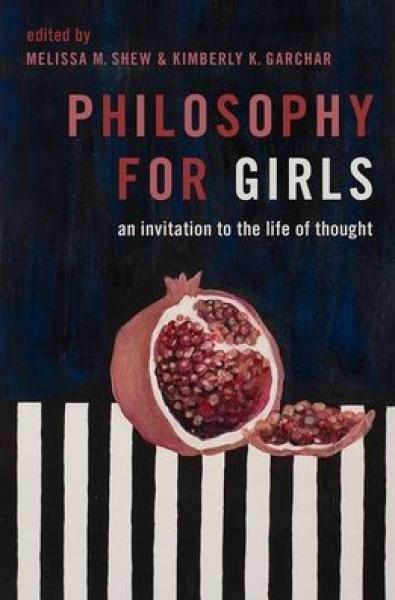Description
equity in philosophy.
If asked to envision a philosopher, people might imagine a bearded man, probably Greek, perhaps in a toga, pontificating about abstract ideas. Or they might think of that same man in the Enlightenment, gripping a quill pen and pouring universal truths onto a page. They may even call to mind a much
more modern man, wearing a black sweater and smoking a cigarette in a Paris caf�, expressing existential angst in a new novel or essay.
What people are unlikely to picture, though, is a woman. Women have historically been excluded from the discipline of philosophy and remain largely marginalized in contemporary textbooks and anthologies. The under-representation of women in secondary and post-secondary curricula makes it harder for
young women to see themselves as future philosophers. In fact, it makes it harder for all people to engage the valuable contributions that women have made and continue to make to intellectual thought. While some progress has been made in building a more inclusive world of philosophy, especially in
the last fifty years, important work remains to be done.
Philosophy for Girls helps correct the pervasive and problematic omission of women from philosophy. Divided into four sections that connect to major, primary fields in philosophy (metaphysics, epistemology, social and political philosophy, and ethics), this anthology is unique: chapters are all
written by women, and each chapter opens with an anecdote about a girl or woman from mythology, history, art, literature, or science to introduce chapter topics. Further, nearly all primary and secondary sources used in the chapters are written by women philosophers. The book is written in a
rigorous, academic spirit but in lively and engaging prose, making serious philosophical insights accessible to readers who are new to philosophy.
This book appeals to a wide audience. Individual readers will find value in these pages--especially girls and women ages 16-24, as well as university and high school educators and students who want a change from standard anthologies that include few or no women. The book's contributors both
represent and map the diverse landscape of philosophy, highlighting its engagement with themes of gender and equity. In doing so, they encourage philosophers current and future philosophers to explore new territory and further develop the topography of the field.
Philosophy for Girls is a rigorous yet accessible entry-point to philosophical contemplation designed to inspire a new generation of philosophers.
"This revolutionary book empowers its readers intellectually by providing a snapshot of perennial and timely philosophical topics. Written by twenty expert women in philosophy and representing a diverse and pluralistic approach to philosophy as a discipline, this book appeals to a wide audience. Individual readers, especially girls and women ages 16-24, as well as university and high school educators and students who want a change from standard anthologies that include few or no women will find value in these pages. This volume contains several notable features: the book is divided into four sections that correspond to major fields in Philosophy-metaphysics, epistemology, social and political philosophy, and ethics-but the chapters within those sections provide fresh ways of understanding those fields. " Every chapter begins with a lively anecdote about a girl or woman in literature, myth, history, science, or art to introduce the chapter's specific topic." Chapters are dominated by women's voices, with nearly all primary and secondary sources used coming from women in the history of philosophy and a diverse set of contemporary women philosophers. "All chapters offer the authors' distinct philosophical perspectives written in their own voices and styles, representing diverse training, backgrounds, and interests." The Introduction and Prologue explicitly invite the book's readers to engage in philosophical conversation and reflection, thus setting the stage for continued contemplation and dialogue beyond the book itself. The result is a rigorous yet accessible entry-point into serious philosophical contemplation designed to embolden and strengthen its readers' own senses of philosophical inquiry and competence. The book's readers will feel confident in knowing that expert women affirm an equitable and just intellectual landscape for all and thus have lovingly collaborated to write this book"--
"[T]his book is a proof of concept that philosophy loses out when it marginalizes, or when it only treats one kind of life as the default, yet claim to universalise on that basis. The writers in this collection ... invite the reader to wonder, to ask further questions, and to perhaps add their own
voices to the ongoing philosophical conversations. Philosophy for Girls provides us with a gift, namely a vision of philosophy as a chorus of voices that is enriched rather than diluted by inclusion." -- Audrey Yap, Philosophers' Magazine
"A fantastic resource and a great service to the discipline and teaching of philosophy. I am both personally and professionally grateful to the editors and the authors for their work. The essays from this rich, inviting, pedagogically-motivated introduction to philosophy will certainly be making
their way onto my syllabi and I imagine those of many other philosophy teachers for years to come." -- Rebecca G. Scott, Harper College, Teaching Philosophy
Product Details
- Oxford University Press, Brand
- Oct 12, 2020 Pub Date:
- 019007292X ISBN-10:
- 9780190072926 ISBN-13:
- 320 Pages
- 9.2 in * 6.5 in * 0.9 in Dimensions:
- 1 lb Weight:




